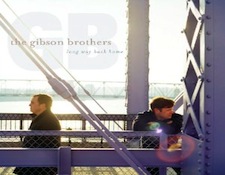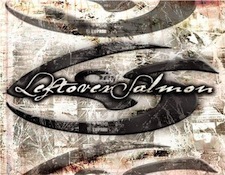It’s the time of year for saving money!

The Gibson Brothers – Long Way Back Home
Sugar Hill records
Being a star in the bluegrass world is different than being a rock star. No big black limos, nubile groupies, or million dollar paychecks. In bluegrass being a star barely guarantees you a decent living wage. But still, that’s better than flipping burgers or driving a truck. The Gibson Brothers have been on the verge of bluegrass stardom for several years. In 1998 they were named Emerging Artists of the Year by the IBMA (International Bluegrass Musician’s Association). Their new album, Long Way Back Home, should put them over the top.
What makes the Gibson Brothers star material? Beautiful original songs, wonderful arrangements, hot picking, and a pair of perfectly matched voices render them thoroughly worthy of first-class bluegrass star status. From the opening fingerpicked guitar lick of “Mountain Song” to the last “hidden track” (a rendition of an old Jimmie Rodger’s song) they have assembled a disc full of musical gems. Seven of the fourteen songs on Long Way Back Home are original. Tunes by the likes of Kiernan Kane, Robbie Robertson, Gordon Lightfoot, Jackson Leap, Chris Jones, and Edgar Edens complete the musical roster. Not many tunes here would qualify as classic hardcore bluegrass. The Gibson Brothers lean more toward the pop/folk side than the hard-driving approach of Del McCoury. Their main influences are the Louvin and Everly Brothers as opposed to the Monroe or Stanley Brothers. My favorite cover on the disc has to be their spine-tingling rendition of “Satan’s Jeweled Crown,” delivered with perfect harmonies, heart-breaking mandolin solos, and righteous pacing.
Using the same basic lineup as their last Sugar Hill album, Bona Fide, with Mike Barber on upright bass and Marc MacGlashan on mandolin joining Leigh Gibson on guitar and Eric Gibson on banjo, Long Way Back Home includes cameos by Jason Carter and Luke Bulla on fiddle, and Rob Ickes on dobro. The production duties are shared by the Gibson brothers and Dave Sinko, who also serves as chief engineer. The sound here is just as good as the music, naturally unobtrusive, allowing the musical parts to blend with effortless ease. Many audiophiles bewail the sonic state of popular musical recordings. They aren’t listening to the right music. They need to hear this recording from Sugar Hill records, because it’s in the zone when it comes to creating high quality acoustic music.
I predict great things for the Gibson Brothers. They split the seams musically between hardcore traditional bluegrass and folkgrass, which makes them both musically fresh yet accessible. I’ve been playing the pits off my advanced review CD copy. Yup, these guys are going to be big bluegrass stars.

Catie Curtis – Dreaming in Romance Languages
Vanguard Records
An art critic once wrote, “If you keep making art on the edges of civilization long enough, mainstream culture will eventually expand to engulf you.” Some of Catie Curtis’ latest songs have found their way into the backgrounds of TV shows, signifying that she has been assimilated by the Borg of conventional culture. Her popularity has mushroomed, not because she has capitulated with the homogenizing great middle, but because occasionally even popular culture must embrace something of quality.
Dreaming in Romance Languages represents Curtis’ fifth studio album since her debut in 1991. Except for one tune from the late Mark Sandman of the band “Morphine” and a pair of co-written songs with Beth Nielson Chapman and Jimmy Ryan, everything on Dreaming in Romance Languages comes from Curtis’ pen alone. My favorite song “Deliver Me” works because of its beautiful melody, understated arrangement, and Curtis’ seductively direct vocals. Her tunes feature personal yet universal lyrics coupled with melodies that are faintly familiar, yet never predictable. This combination makes her music nearly impossible to resist.
Produced by Curtis along with Trina Shoemaker and Tome Dube, who also share recording engineer credits, Dreaming in Romance Languages is polished without sounding too slick. Even though the extensive roster of players threatens an album that could be fraught sonic histrionics, the production stands out because of its restraint and lack of sonic bombast. Even when strings are used, such as on “Deliver Me” they stay well in the background, never intruding on the basic organic texture of the song.
In our age where each generation and cultural sub-group tries to differentiate itself through music designed to alienate anyone not in their tribe, it’s refreshing to find music that is personal, yet appeals to multiple generations and lifestyles. Dreaming in Romance Languages is the sort of album that you could put on during a family gathering and not offend gramps or your 15 year old. Despite its universal appeal Curtis’ music has both backbone and soul. Top that, Brittany.

Leftover Salmon – Leftover Salmon
High Country Records
Leftover Salmon hail from my hometown, Boulder, Colorado. Given all the negative publicity Boulder has received as of late with football players running amuck, and several well-publicized and long-standing unsolved murders, we’ve needed some good news to counteract that stuff. Leftover Salmon’s latest album makes me glad to be a Boulderite. They have faced personal adversity (one of their founding members Mark Vann died from cancer two years ago), and persevered, expanding on their unique blend of bluegrass, rock, cajun, folk, and old-time stringband to create fresh new music.
Leftover Salmon’s current lineup features co-founders Drew Emmitt on mandolin and Vince Herman on guitar joined by Greg Garrison on bass, Bill McKay on keyboards, Noam Pikelny on banjo, and Jose Martinez on drums and percussion. This roster preserves the band’s original sound while adding more versatility and musical breadth. Emmitt and Pikelny seem to delight in trading innovative solos, especially on the Jim Page tune “Everything is Round.” Nine of the eleven songs on Leftover Salmon were penned by band members, with Drew Emmitt contributing four, Vince Herman adding two, and Norm Pikelny, Greg Garrison, and Bill McKay each writing one. The most noteworthy feature of all these songs is how musically consistent they are. Every tune has a wonderful balance of both traditional and contemporary influences.
Little Feat’s keyboard player and independent producer Bill Payne acted as producer, bringing his sympathetic ear and light touch to his duties. The sound here has a rustic acoustic feel, even with the addition of electric bass, full drum set, and electric keyboards. Engineer James Tuttle, who has been recording Boulder’s E-Town radio show for over ten years, also deserves a share of the credit for creating this lovely-sounding CD.
Some critics might trumpet, “Leftover Salmon are back!” Personally, I think they never left. Their latest release just proves they’re here to stay awhile.





